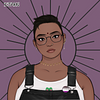Take a photo of a barcode or cover
"The most important thing about a family is that all the people in it love each other."
This is my first time reading the book with the Cornell illustrations. I liked them better than the original.
Lovely! It is so inclusive of all kind of families that reading this book is like getting hug from your parent and being told that everything and everyone is okay.
This edition has been streamlined to be shorter and more focused on the main message of the story--a great re-write, but still resonates with a timeless message.
This edition has been streamlined to be shorter and more focused on the main message of the story--a great re-write, but still resonates with a timeless message.
Heather Has Two Mommies is a book that explains non-traditional family styles to kids, especially in the late 80s, where there weren't books depicting the acceptance of same-sex couples. Over the years, Heather Has Two Mommies has been updated and slightly changed. However, it is still a great story for kids of gay parents to see families like their own, and children in cis-gendered families to see that there are increasingly complex family and relationship structures within society.
Aww, what a precious (and important!) book. I liked the point it makes about how each family is unique, as reflected in each child's drawing, and how the most important part is that family members love each other. So glad these types of books exist!
Beautifully Illustrated children's book which teaches that all families are special and unique in its own way. Happy to find books like these.
Leslea Newman, Heather Has Two Mommies, Tenth Anniversary Edition (Allyson, 2000)
“The most important thing about a family is that the people in it love each other.” It is evident to anyone with eyes that families come in all shapes and sizes these days, and Leslea Newman's most famous book, Heather Has Two Mommies, was one of the groundbreaking works in pointing that fact out. It needed pointed out in 1989, and it still does twenty years later, because there is an odd subspecies of human who seems to only be able to exist by removing his own eyes, or refusing to believe the evidence they provide him. It should be no surprise that members of that same subspecies have spent the time since its publication trying to make sure no one can actually read the book (and in reaction, Newman made some changes to this tenth anniversary edition, which she details in an afterword). With all the talk about how the book promotes the “rampant homosexual agenda”, which Newman notes with a great deal of puzzlement in that same afterword, I was kind of expecting some sort of militant silliness like the other kids at Heather's daycare ganging up on her and making fun of her because her family is different. Now, a situation like that I could see as promoting some sort of agenda (especially if it got resolved through some sort of superhuman ability to make people see the light through the power of speech or something like that), but it seems to me that those who would ascribe the promotion of any agenda in this book save the reporting of the evidence of one's own sensory organs is probably reading more into the book than is actually there. This is a tender, easy-to-read tale about a family that may not conform to the societal norms of a time long past, but is no less a family for that. And that's all it is. ****
“The most important thing about a family is that the people in it love each other.” It is evident to anyone with eyes that families come in all shapes and sizes these days, and Leslea Newman's most famous book, Heather Has Two Mommies, was one of the groundbreaking works in pointing that fact out. It needed pointed out in 1989, and it still does twenty years later, because there is an odd subspecies of human who seems to only be able to exist by removing his own eyes, or refusing to believe the evidence they provide him. It should be no surprise that members of that same subspecies have spent the time since its publication trying to make sure no one can actually read the book (and in reaction, Newman made some changes to this tenth anniversary edition, which she details in an afterword). With all the talk about how the book promotes the “rampant homosexual agenda”, which Newman notes with a great deal of puzzlement in that same afterword, I was kind of expecting some sort of militant silliness like the other kids at Heather's daycare ganging up on her and making fun of her because her family is different. Now, a situation like that I could see as promoting some sort of agenda (especially if it got resolved through some sort of superhuman ability to make people see the light through the power of speech or something like that), but it seems to me that those who would ascribe the promotion of any agenda in this book save the reporting of the evidence of one's own sensory organs is probably reading more into the book than is actually there. This is a tender, easy-to-read tale about a family that may not conform to the societal norms of a time long past, but is no less a family for that. And that's all it is. ****
The controversial classic - what a lovely story about family and how many different ways they can be put together. The illustrations are simple pencil drawing and perfect to the story. Not only that but a good story on first going to daycare or preschool.
It was just so slow and dull.
I wanted to love it, but it never really captured my attention.
I wanted to love it, but it never really captured my attention.







